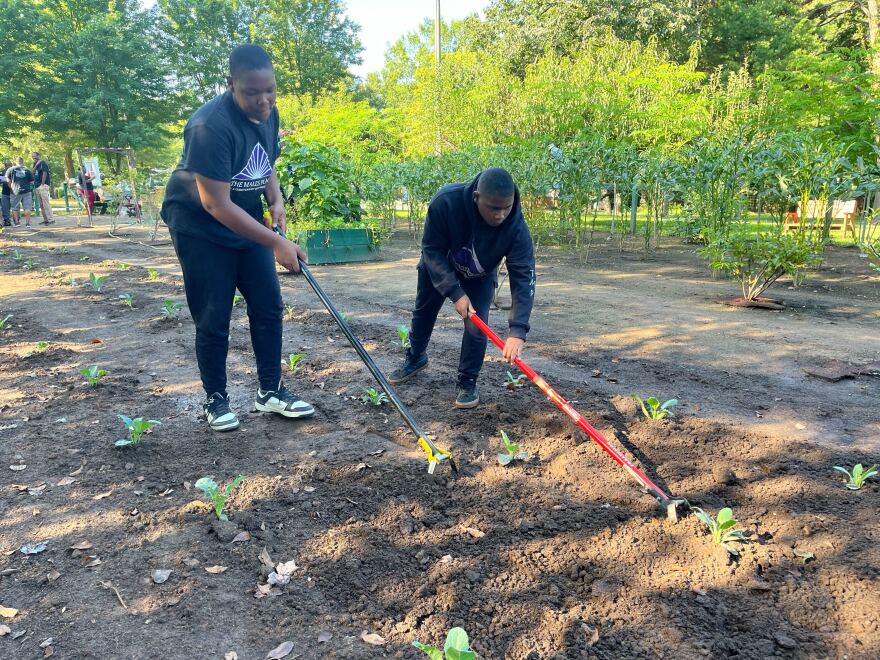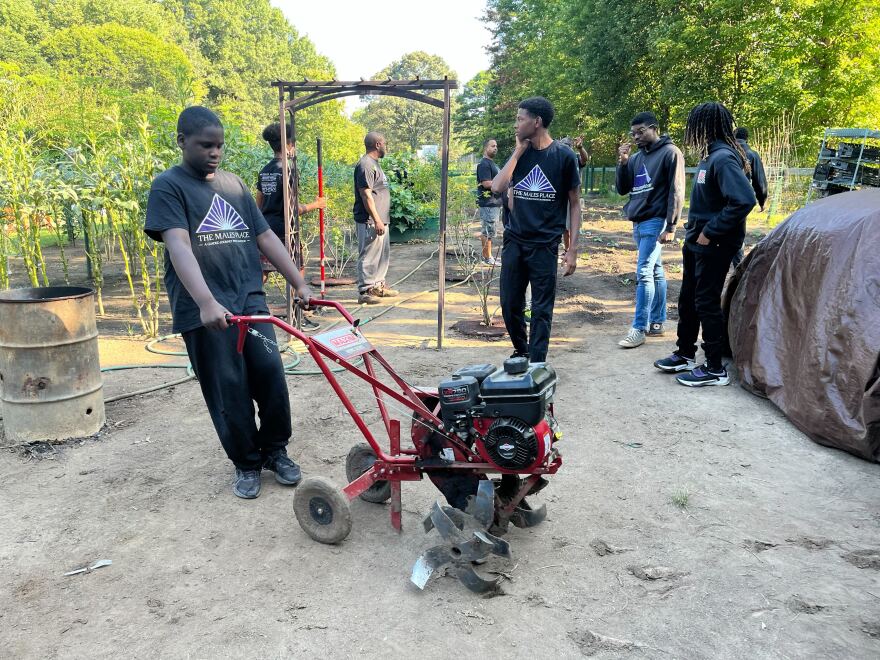This story first appeared as part of WFAE's EQUALibrium newsletter, exploring race and equity in the Charlotte region. Get the latest news and analysis in your inbox first by signing up here.
A mentorship program in Charlotte is working to empower and teach life skills to young Black men through agriculture while addressing community issues in one of Charlotte’s low-income Corridors of Opportunity.
Basil plants dot the borders of a community garden near Beatties Ford Road, where peppers and tomatoes grow in raised garden beds. Near the beds, a group of young Black men gather in a circle. They stand upright, some crossing their hands behind their back while waiting for instructions from Baba Reggie Singleton — the founder of The Males Place.

“Our focus is to socialize them, where we draw on time-honored traditions, our history, culture, and experience to properly develop and socialize them so they understand who they are,” Singleton said. “We use three major tenets: mentorship, agriculture and social justice.”
The nonprofit works with boys 12 to 18 years old. Singleton draws on his upbringing around the Sea Islands near Charleston — where he did seasonal work that included picking and growing crops starting around age five to help support his family — to teach the boys life skills. The Beatties Ford Road corridor has higher rates of violent crime than the city as a whole, and many residents lack access to healthy, fresh food.
Singleton says the garden is a way to address those issues.
“The agriculture piece is not only addressing and ensuring that we have access to clean, healthy food but deeper concepts into being self-sufficient, solving problems, as well as being able to work side by side with young people in natural areas,” Singleton said.
Kingston Wizzart, 14, is one of about a dozen boys working in the garden. He rakes the soil to help dinosaur kale and collard greens grow. Wizzart, who attends West Charlotte High School, says the program brings out another side of him.
“I used to be more quiet and to myself, but since I joined The Males Place, I started talking to more people," Wizzart said. "I’ve been showing a little bit more of my inner self that nobody has really ever seen before."

The program started decades ago as a Mecklenburg County Health Department reproductive clinic for men to reduce teen pregnancy in the Black community. Singleton joined the initiative in 1993, after he moved to Charlotte. He soon realized that the program needed to address more than reproductive rates.
“A rising increase of Black-on-Black crime, the rising rate of unintended pregnancy, and the absence of fathers in the homes, in the lives of the young people,” Singleton said. “In order to truly impact these young people, we needed to be able to counteract some of those negative images and messages and modeling that our young people were seeing.”
Troy Allen oversees the education side of the program and checks in with boys regularly. “We're certainly checking in on their grades, trying to provide any type of support that they need, directing them to resources as it relates to tutoring online resources,” Allen said. “We check in periodically to understand how they're performing in school, attendance, that type of thing.”

The Males Place has taken the boys on trips to places like Charleston, South Carolina; Washington, D.C., Ghana, and Cuba to understand the history of the Black experience in different parts of the world.
“It’s to help expose our young people beyond Charlotte, to help them broaden their experiences, and to see beyond Beatties Ford Road and (Interstate) 485 and to not only make impacts in their own homes and communities but to have a global impact," Singleton said.
As this year's growing season wraps up, Singleton remains rooted in ensuring young men in his community keep blossoming. The program is working on another trip to Africa, to Ghana, where they hope to take about 20 boys next year in June.



